Overview
Chronic Obstructive Pulmonary Disease (COPD) can indeed qualify as a disability. If it significantly limits your ability to perform basic work activities, the Social Security Administration (SSA) may provide support. We understand that navigating this process can feel overwhelming.
To improve your chances of receiving disability benefits, it’s essential to meet specific medical documentation requirements. This includes:
- Pulmonary function tests
- Treatment records that demonstrate the severity of your condition
By providing this information, you can effectively communicate your struggles and needs.
Remember, you are not alone in this journey. Many individuals face similar challenges, and there are resources available to help you through the process. We're here to help you take the next steps toward securing the support you deserve.
Introduction
Chronic Obstructive Pulmonary Disease (COPD) affects millions of people, and we understand that many may feel uncertain about its implications for disability benefits. As you navigate the physical and emotional challenges of this progressive lung condition, knowing whether COPD qualifies as a disability can profoundly impact your access to essential support. It's common to feel overwhelmed by the complexities of the Social Security Administration's criteria and the application process. How can you effectively advocate for your rights and secure the benefits you deserve?
In this article, we delve into ten crucial facts about COPD and its disability status, offering insights and guidance for those in need. You're not alone in this journey, and we're here to help you find the information and support you seek.
Turnout: Streamlining COPD Disability Claims with AI Support
At Turnout, we understand that submitting disability applications for Chronic Obstructive Pulmonary Disease (COPD), which raises the question of whether is COPD a disability, can be overwhelming. That's why we utilize advanced AI technology to streamline the process, offering you the support you need. By automating essential tasks like document handling and follow-ups, we ensure you receive prompt assistance every step of the way.
This progressive approach significantly reduces the administrative burden on you, making the entire process more effective and manageable. As a result, individuals seeking help find our system more navigable and accessible. With the integration of AI and the expertise of trained nonlawyer advocates for SSD claims, along with IRS-licensed enrolled agents for tax debt relief, we aim to shorten the average adjudication time for SSDI claims to just 6 to 8 months. This means you can receive the benefits you deserve more swiftly.
This transformation is vital, especially considering that one in four adults with disabilities aged 18-44 face unmet healthcare needs due to cost. We know how important timely support is in navigating these complex systems. Remember, you are not alone in this journey; we're here to help you every step of the way.
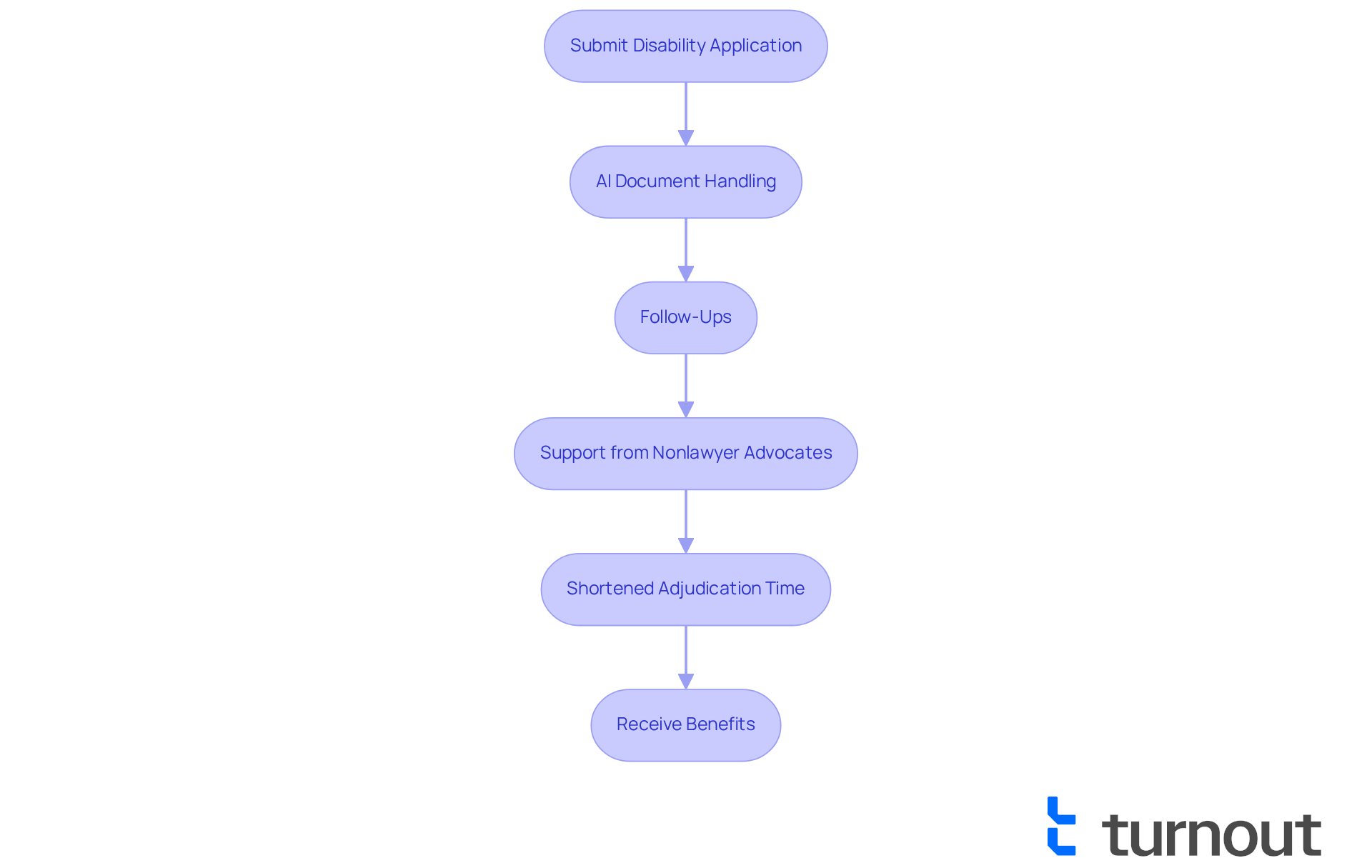
Chronic Obstructive Pulmonary Disease (COPD): Definition and Overview
Chronic Obstructive Pulmonary Disease (COPD) is a progressive lung condition that encompasses ailments like emphysema and chronic bronchitis. It is characterized by persistent respiratory symptoms and airflow limitation, leading to concerns about whether COPD is a disability that significantly hinders your ability to engage in daily activities and maintain employment. In fact, in 2018, around 9 million adults, or 3.6% of those aged 18 and older, were diagnosed with chronic bronchitis. This statistic highlights the widespread impact of respiratory conditions on our community.
The effects of COPD extend beyond physical limitations. Many individuals face exhaustion, breathlessness, and persistent coughing, transforming everyday tasks—like climbing stairs or carrying groceries—into daunting challenges. These symptoms can disrupt work life, making it increasingly difficult to fulfill job responsibilities.
Consider the real-world challenges faced by those with COPD. For instance, a 62-year-old woman with severe emphysema may find herself unable to walk short distances without struggling for breath. This often leads her to seek assistance benefits. Similarly, a 55-year-old man with chronic bronchitis may experience frequent hospitalizations, complicating his ability to maintain steady employment.
Understanding whether COPD is a disability is crucial for those seeking assistance. The seriousness of the condition can significantly influence the question of whether COPD is a disability for eligibility for support. By acknowledging the difficulties posed by COPD, you can navigate the application process more effectively and seek the help you need. Remember, you are not alone in this journey. Turnout offers valuable support not only with SSD applications but also with tax debt relief, providing a comprehensive strategy for financial assistance.
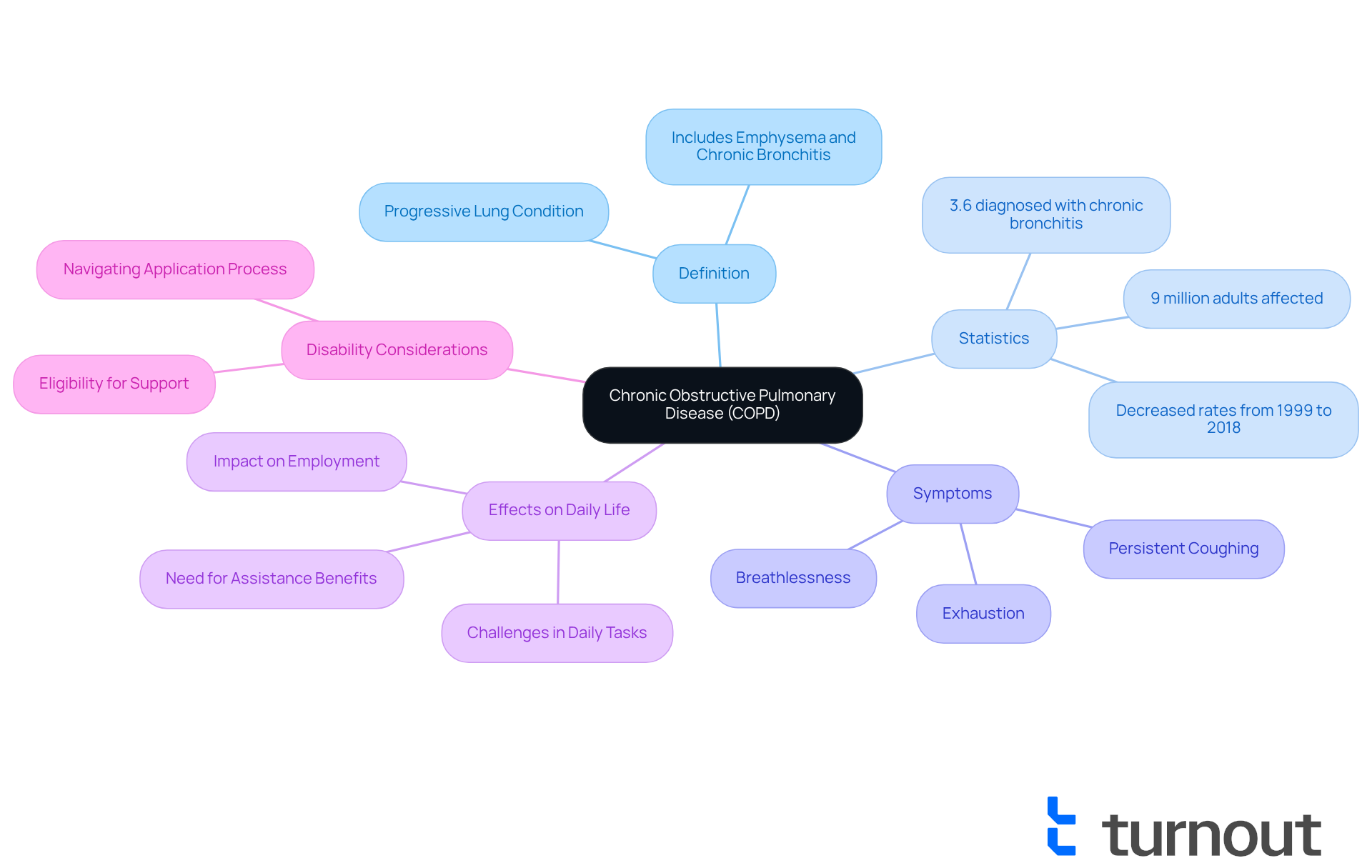
SSA Criteria for COPD Disability: Key Requirements and Guidelines
If you’re facing the challenges of COPD, you may be asking, is COPD a disability that can help you qualify for benefits, as it can feel overwhelming. To receive support, it’s essential to meet specific criteria set by the SSA. This includes demonstrating a significant reduction in lung function through pulmonary function tests and proving that your condition severely limits your ability to perform basic work activities.
We understand that gathering the necessary documentation can be daunting. You’ll need comprehensive medical records that substantiate your claims, including treatment history and evaluations from your physician. This is where Turnout can make a difference. We offer valuable assistance in navigating the SSD claims process through tools and services designed to support you.
Our trained nonlawyer advocates provide personalized guidance, helping you understand the requirements and collect the necessary documentation. With our help, you can focus on what matters most—your health and well-being—while we take on the complexities of the claims process. Remember, you are not alone in this journey; we’re here to help you every step of the way.
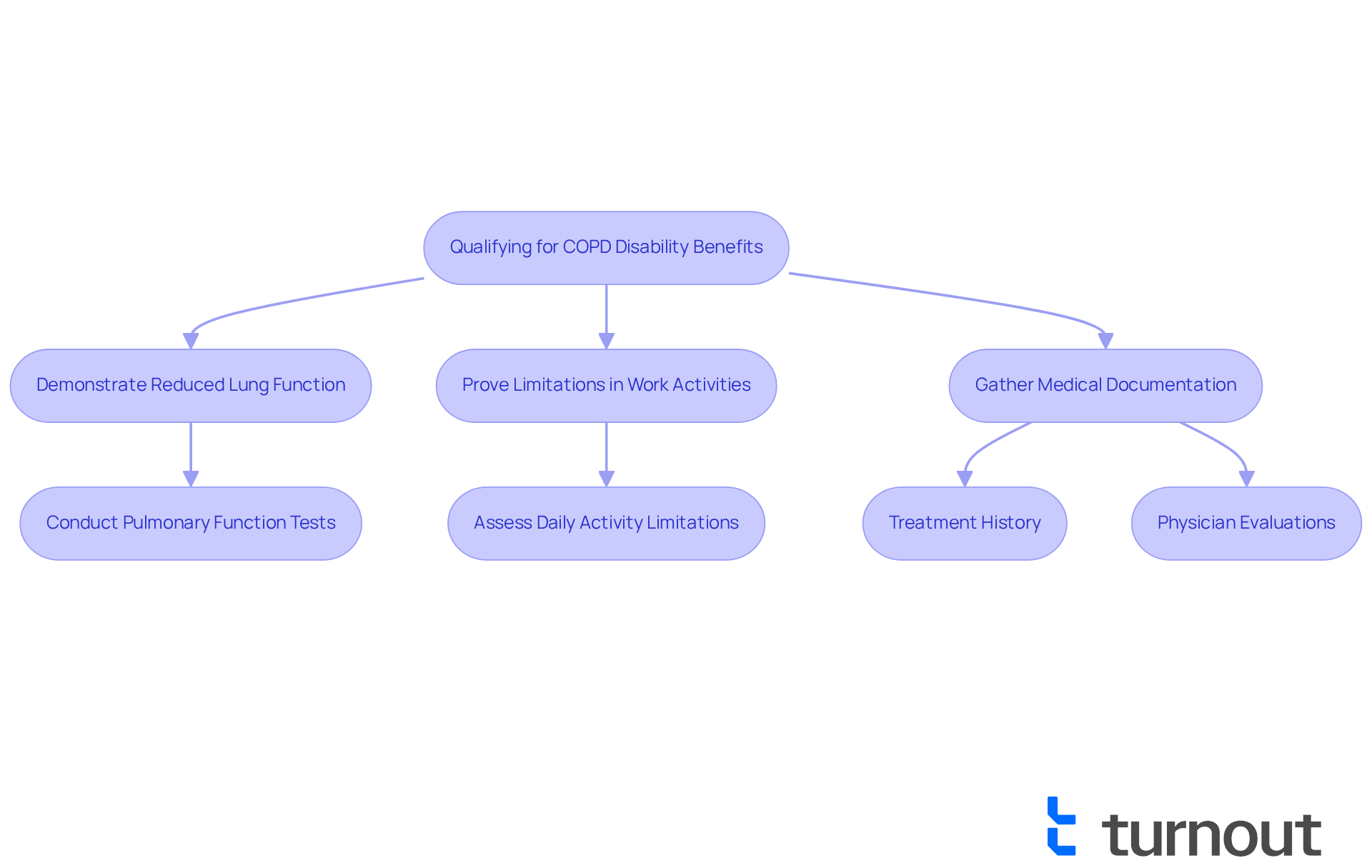
Stages of COPD: Understanding Severity and Disability Qualification
Chronic obstructive pulmonary disease (COPD) is categorized into four stages, ranging from mild to extremely severe. Each stage reflects the degree of airflow limitation and the associated symptoms. We understand that navigating these phases can be challenging, but comprehending them is essential for applicants.
The Social Security Administration (SSA) generally requires proof to determine if COPD is a disability, specifically of moderate to severe severity, for qualification. Individuals in the later stages may experience significant limitations in physical activity, leading to the consideration of whether COPD is a disability that makes them more likely to qualify for benefits.
Remember, you are not alone in this journey, and we're here to help you through it.
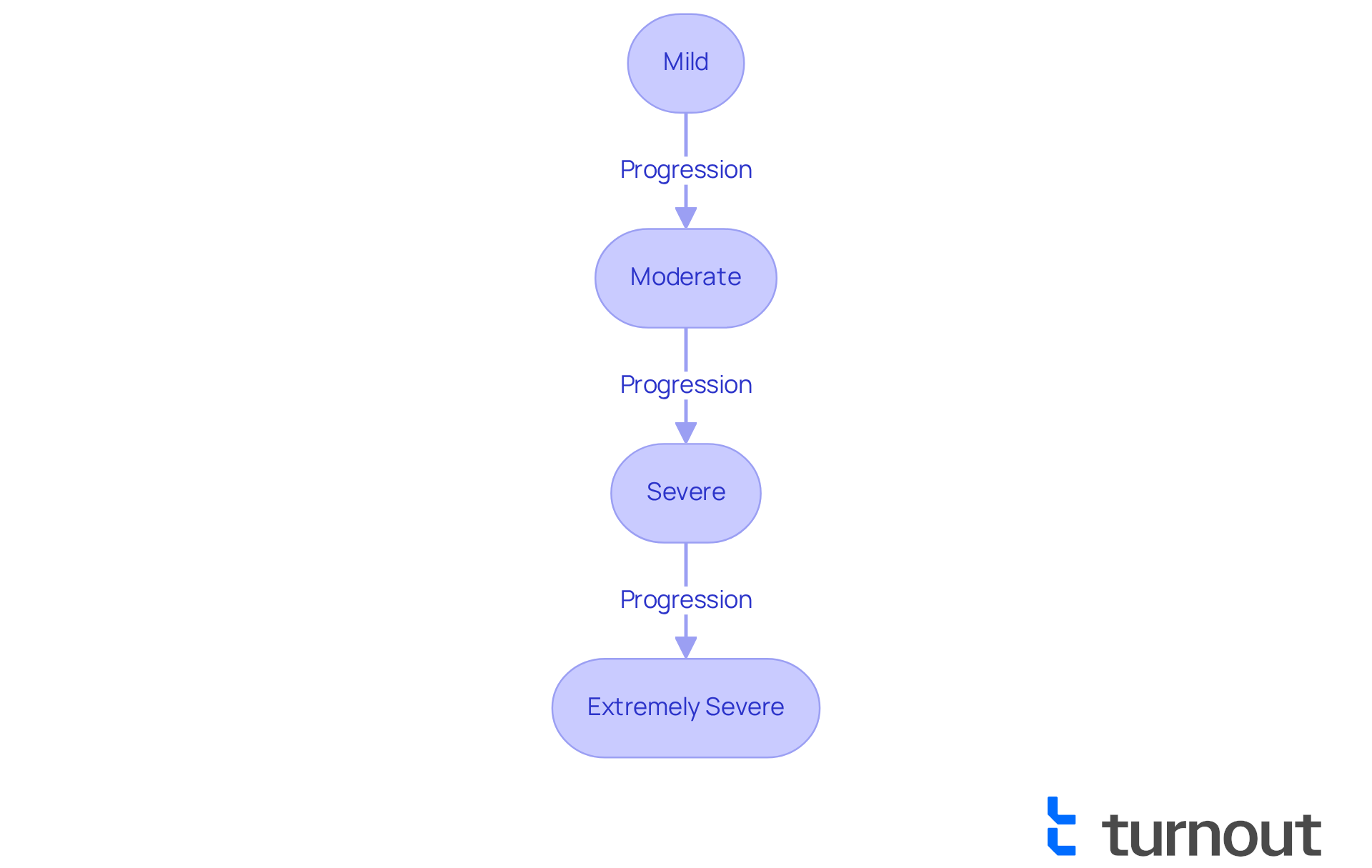
Medical Evidence for COPD Disability Claims: What You Need to Know
When submitting a disability claim for chronic obstructive pulmonary disease, we understand that it is important to determine if COPD is a disability, as providing strong medical evidence is essential to illustrate the severity of your condition. This evidence should consist of:
- Pulmonary function test (PFT) results
- Imaging studies
- Treatment records
- Letters from healthcare providers that explain how chronic obstructive pulmonary disease impacts daily life
PFTs, especially spirometry, are crucial as they assess lung function and can reveal the extent of airflow restriction, which is vital for determining the severity of chronic obstructive pulmonary disease. For instance, an FEV1/FVC ratio of less than 0.70 is typically diagnostic of COPD, and lower FEV1 values correlate with increased mortality risk. Additionally, a peak expiratory flow of less than 80% predicted has a sensitivity of 90% for detecting airflow limitation, further underscoring the necessity of thorough documentation.
Thorough documentation not only reinforces your argument but also assists the Social Security Administration (SSA) in making informed decisions about eligibility. It's common to feel overwhelmed, but statistics show that claims supported by thorough medical documentation have a higher success rate. A significant percentage of successful claims are linked to detailed PFT results and consistent follow-up assessments. Moreover, arterial blood gas (ABG) analysis, which assesses oxygen and carbon dioxide levels, is especially beneficial for individuals with chronic obstructive pulmonary disease and should be part of your medical evidence.
Expert opinions stress the significance of recording all pertinent medical history and treatment responses. This information is essential for demonstrating whether COPD is a disability that impacts your ability to carry out daily activities.
In summary, thorough documentation of chronic obstructive pulmonary disease is essential for improving your chances of a successful claim for benefits, especially when determining if COPD is a disability. Remember, you are not alone in this journey, and we’re here to help you navigate the process.
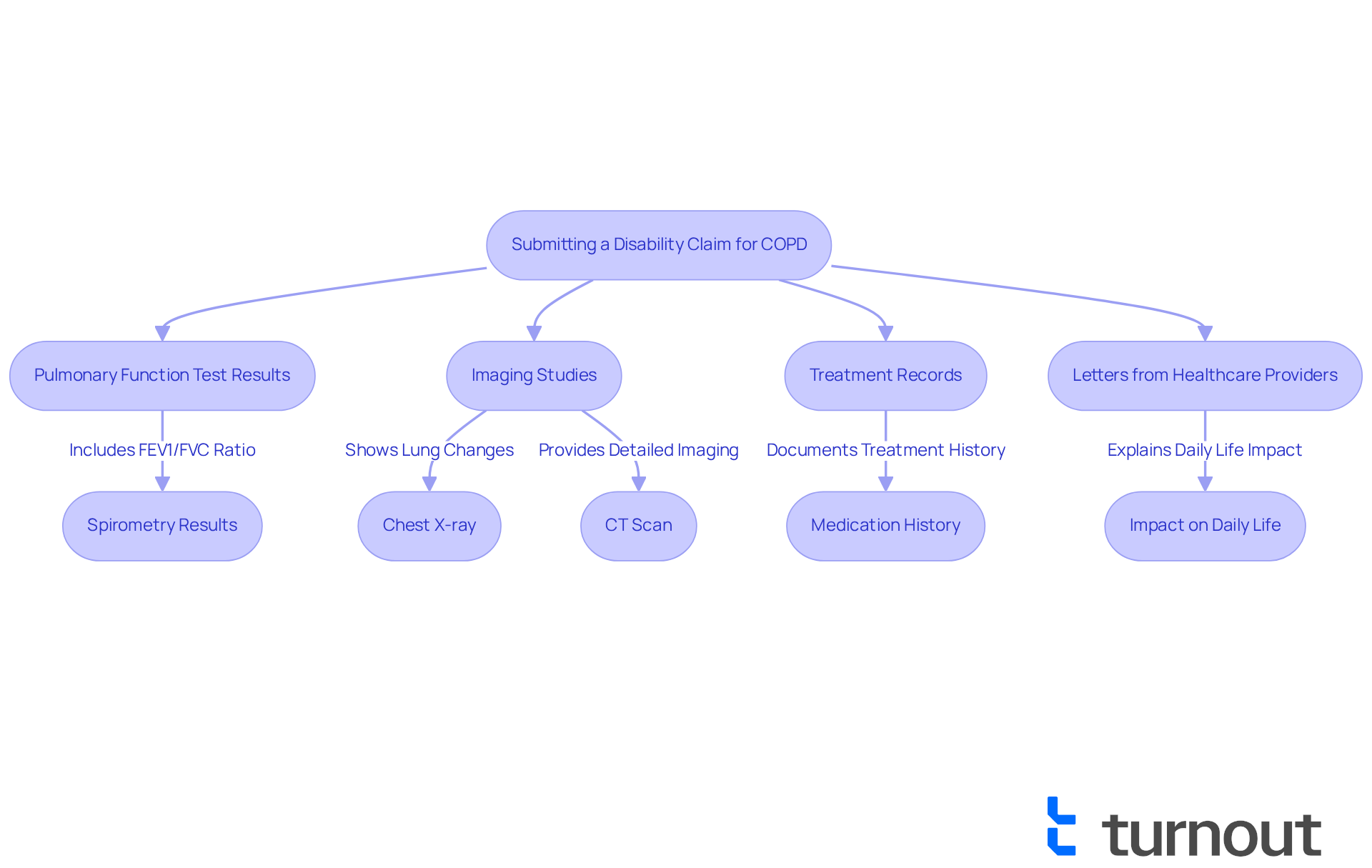
Navigating the COPD Disability Application Process: Step-by-Step Guide
Navigating the application process to determine if COPD is a disability can feel overwhelming. We understand that each step may seem daunting, but you are not alone in this journey. Here are some key steps to guide you:
- Gather the necessary medical documentation.
- Complete the SSA application form accurately.
- Submit the application along with supporting evidence.
- Monitor the application status.
- Be prepared for potential follow-up requests from the SSA.
Each of these steps is essential for ensuring a seamless application process and addressing the question of whether COPD is a disability, thereby increasing your chances of approval. At Turnout, we’re here to help you every step of the way. We offer tools and services, including assistance from trained non-professional advocates who can help you navigate the intricacies of SSD applications.
Please remember, Turnout is not a law firm and does not provide legal advice. Our goal is to empower you to manage your application effectively and access the benefits you deserve. You are taking an important step towards securing the support you need, and we are here to support you throughout this process.
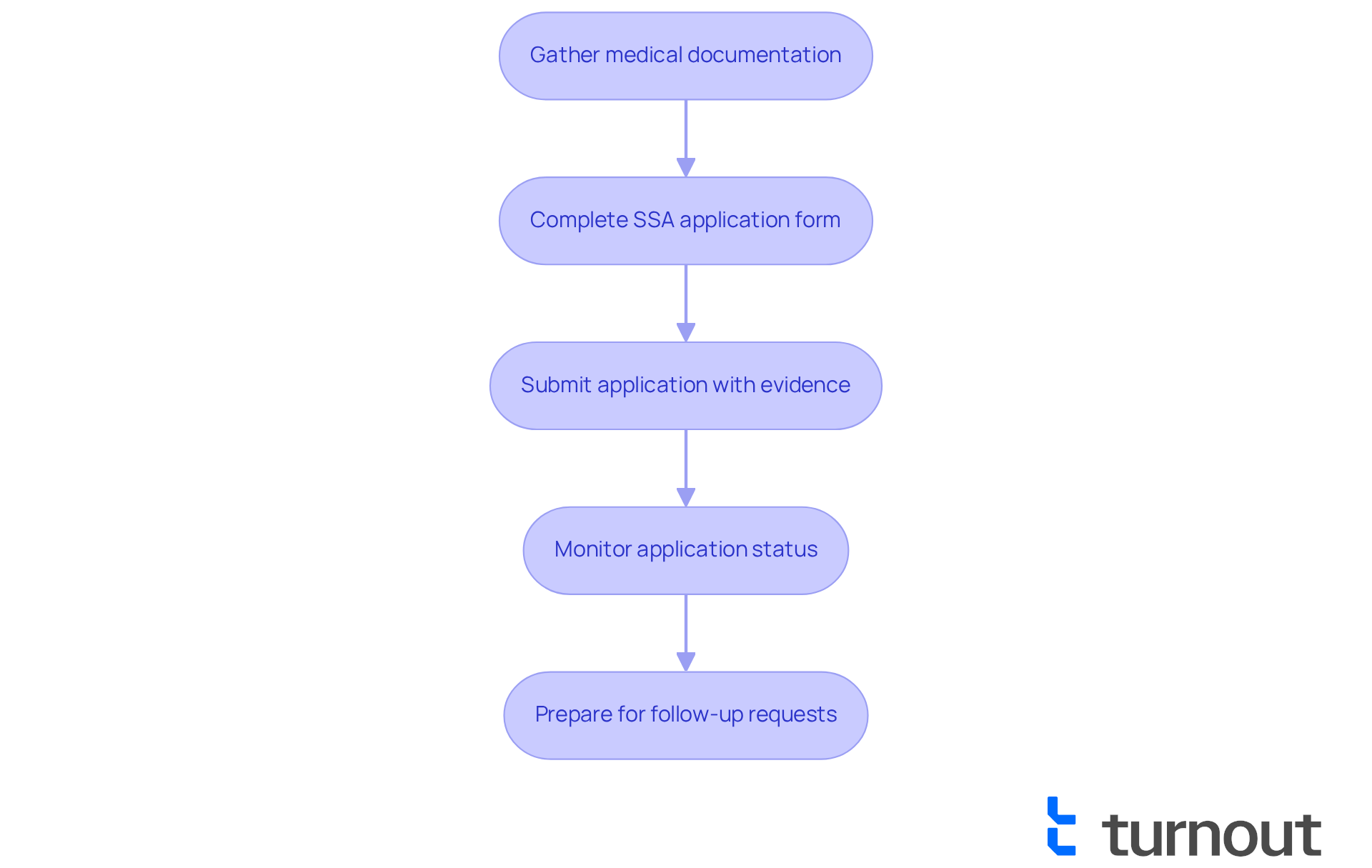
What to Do If Your COPD Disability Claim Is Denied: Appeals Process Explained
If your claim about whether COPD is a disability is denied, we understand how disheartening that can be. You have the right to appeal the decision, and it’s important to know that you are not alone in this journey. The appeals procedure usually includes several stages:
- Request a reconsideration of the decision,
- If denied again, seek a hearing before an administrative law judge, and
- Present additional evidence and arguments during the hearing.
It’s crucial to prepare thoroughly for each stage. Did you know that approximately 87 percent of first appeals are denied? This statistic underscores the importance of understanding the process for effectively advocating for your rights and securing the benefits you need.
Gathering comprehensive medical documentation and accurately completing the Activities of Daily Living Questionnaire can significantly impact your chances of success. Remember, persistence is key. While only about 35 percent of initial applications are approved, approximately 62 percent of second appeals at the hearing level are awarded. This provides hope for those who continue to fight for their rights. You're taking an important step by seeking assistance, and we're here to help you through it.
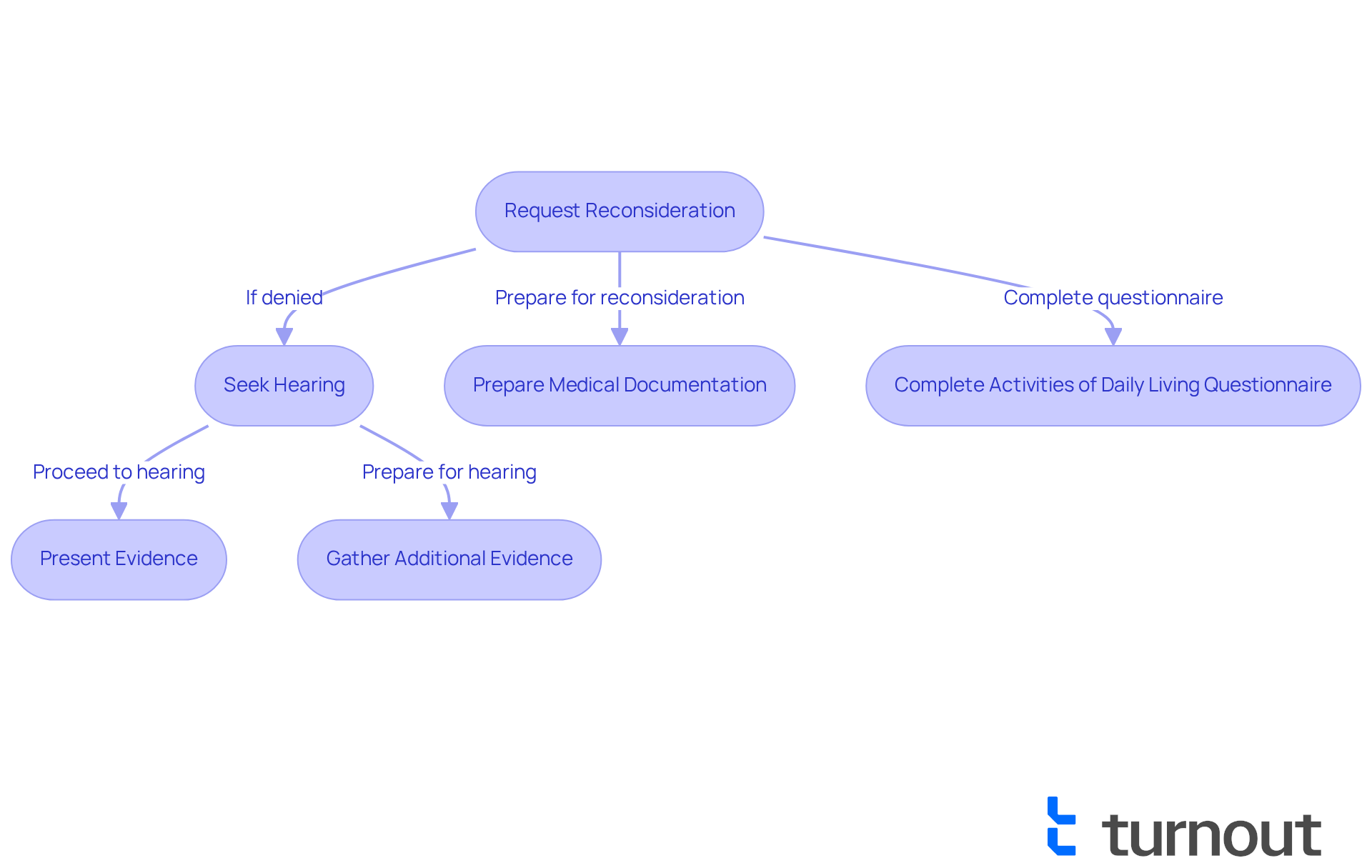
Financial Considerations: Monthly Payments and Benefits for COPD Disability
If you are authorized for assistance with chronic obstructive pulmonary disease, it raises the question of whether COPD is a disability, as you may receive monthly payments that vary based on your employment background and the severity of your condition. We understand that navigating this process can be challenging, and knowing how these payments are calculated is crucial for you as an applicant. Additionally, you might qualify for other forms of assistance, such as Medicare, which can further ease the financial burdens associated with healthcare costs. Remember, you are not alone in this journey; we’re here to help you find the support you need.
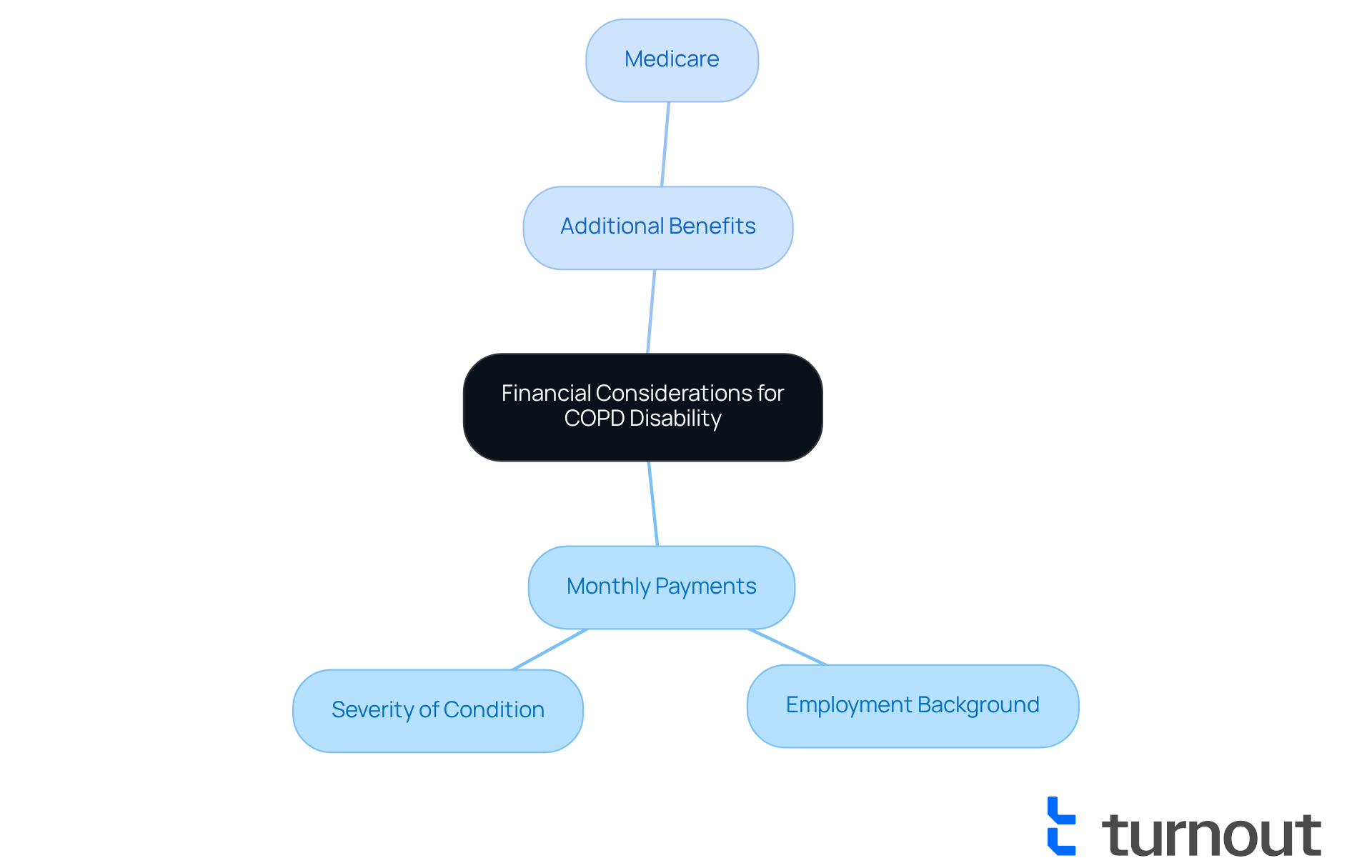
Related Conditions and Their Impact on COPD Disability Claims
Individuals with COPD often encounter additional health challenges, such as asthma, heart disease, and obesity. We understand that these comorbidities can complicate disability requests significantly, as they influence the overall evaluation of your health and functional capacity. For example, heart disease may exacerbate respiratory issues, leading to a more complex evaluation process by the Social Security Administration (SSA).
It's essential for you to reveal all pertinent health concerns when submitting your requests. Complete documentation enables a detailed assessment, ensuring that nothing is overlooked. Omitting these conditions could result in an incomplete evaluation, potentially jeopardizing the authorization of your request. Furthermore, secondary conditions can enhance the credibility of your assertion by providing supplementary evidence of their overall effect on your daily life.
Thus, understanding if COPD is a disability and the relationship between chronic obstructive pulmonary disease and associated health concerns is vital for individuals like you who are pursuing support benefits. Remember, you're not alone in this journey; we're here to help you navigate these challenges.
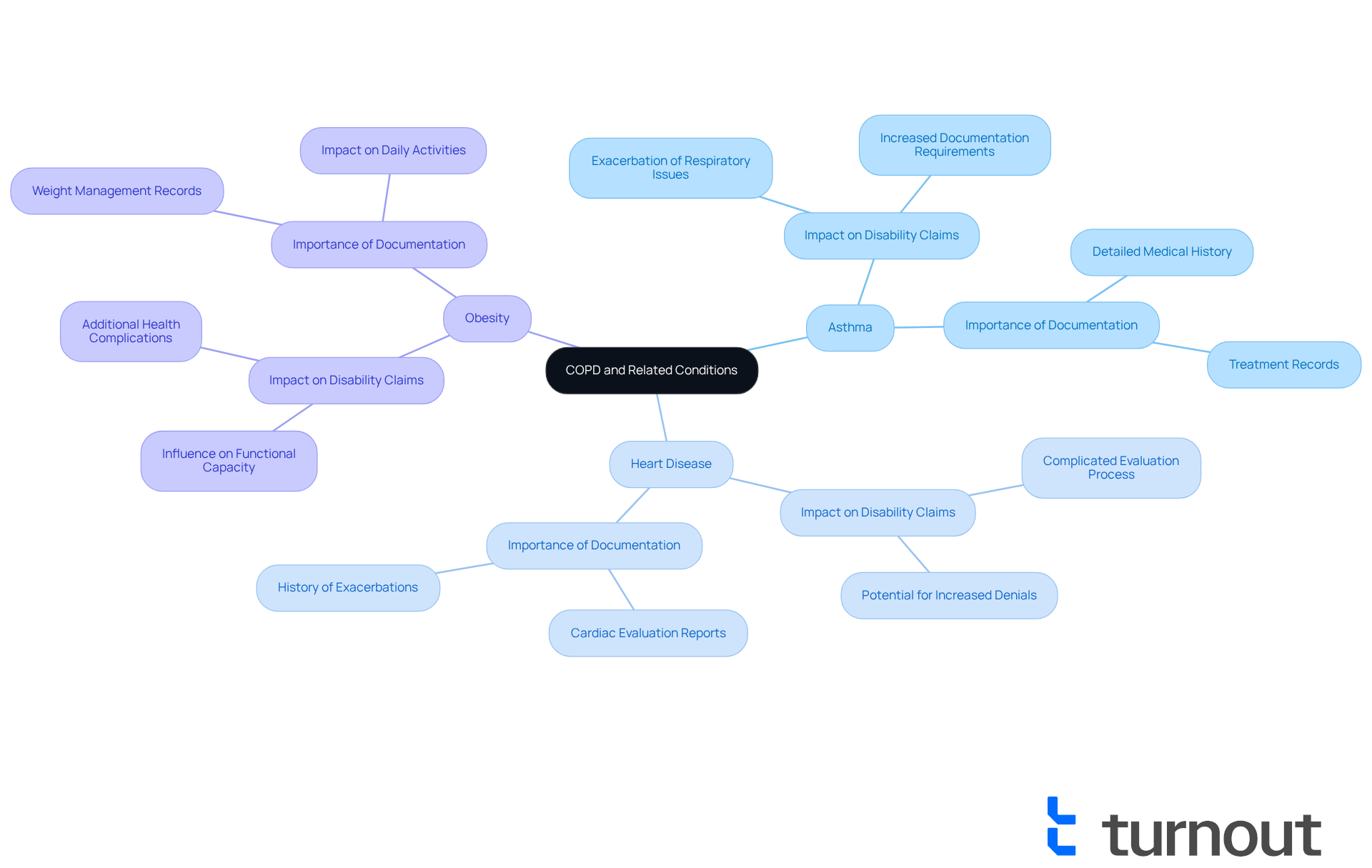
Working with Advocates: Enhancing Your COPD Disability Claim Success
Interacting with advocates from Turnout can significantly increase your chances of success when determining if COPD is a disability. These trained nonlawyer advocates provide personalized support, helping you gather essential documentation and ensuring that your applications are filled out correctly. It’s important to note that Turnout is not a law firm and does not provide legal representation. However, their understanding of the Social Security Administration (SSA) system can lead to more favorable outcomes.
We understand that navigating the complexities of disability claims can be overwhelming. Advocates assist in tracking medical records, coordinating necessary tests like spirometry, and ensuring that Residual Functional Capacity (RFC) forms are submitted accurately and on time. Statistics reveal that cases with representative involvement have approval rates significantly higher than those without such support.
Many applicants find that using advocacy services results in more streamlined application processes and quicker resolutions. For instance, one case study highlighted an applicant who collaborated with a Turnout supporter and managed the SSA procedures more effectively, achieving a successful outcome in a shorter timeframe.
Overall, investing in advocacy support through Turnout can be transformative for individuals addressing whether COPD is a disability. To make the most of this support, consider reaching out to a qualified advocate early in the claims process. This ensures that all necessary documentation is prepared and submitted correctly. Remember, you are not alone in this journey; we’re here to help.
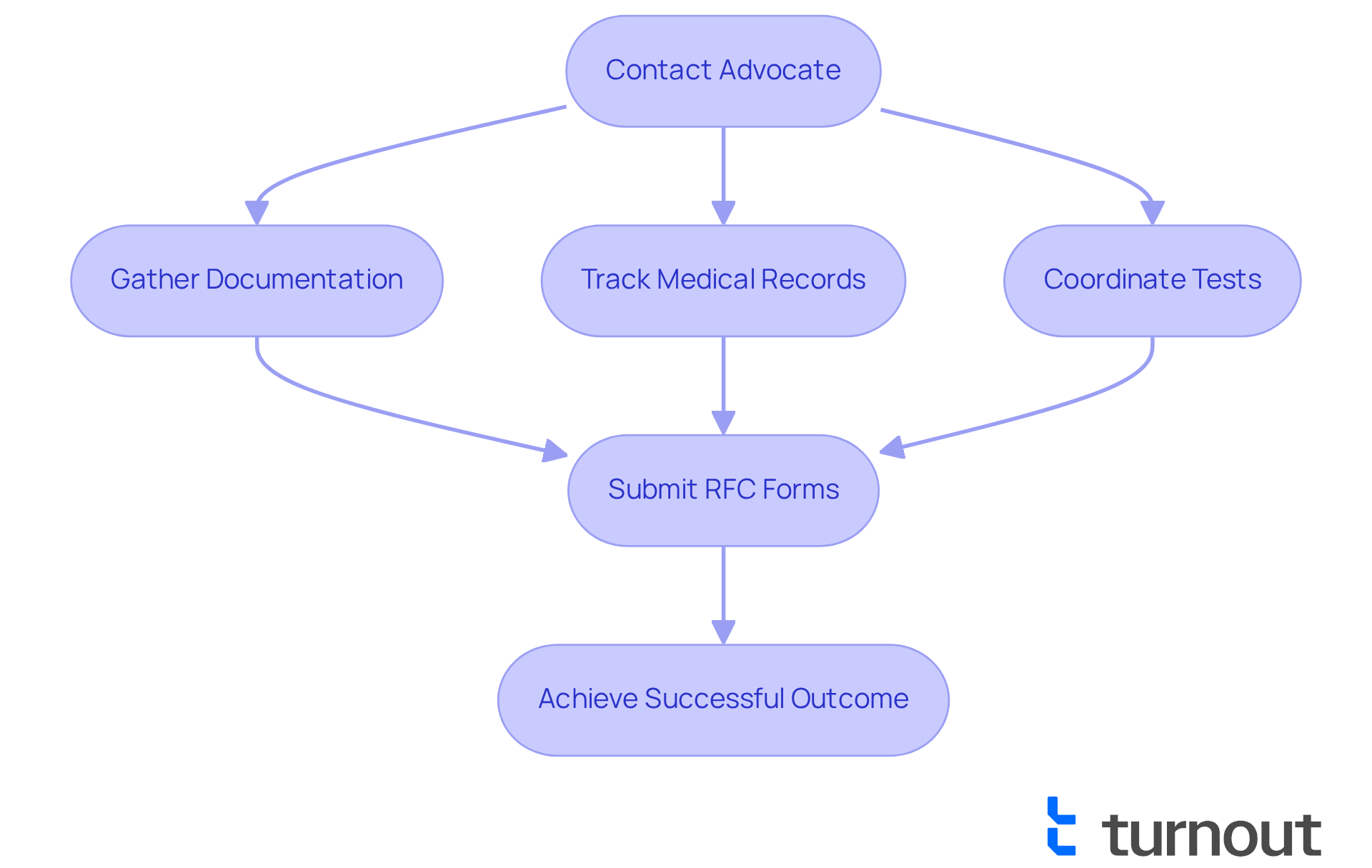
Conclusion
Navigating the complexities of Chronic Obstructive Pulmonary Disease (COPD) and its implications for disability claims can be daunting. We understand that determining whether COPD qualifies as a disability is crucial for those seeking support, as it directly impacts access to necessary benefits. This article has explored the various facets of COPD, from its definition and symptoms to the specific criteria set by the Social Security Administration (SSA) for qualifying as a disability.
Key insights include:
- The importance of thorough medical documentation
- The stages of COPD that influence eligibility
- The role of advocates in streamlining the application process
It's common to feel overwhelmed, but the integration of AI technology significantly enhances the efficiency of handling disability claims, making it easier for individuals to receive timely assistance. The challenges faced by those with COPD, compounded by potential comorbidities, highlight the need for comprehensive support throughout the claims process.
Ultimately, securing disability benefits for COPD is not just about understanding the paperwork; it's about recognizing the profound impact this condition has on daily life. You are not alone in this journey. Individuals are encouraged to seek help from trained advocates and utilize available resources to navigate the system effectively. The journey may be challenging, but with the right support, it is possible to achieve the benefits and assistance needed for a better quality of life.
Frequently Asked Questions
What is Chronic Obstructive Pulmonary Disease (COPD)?
COPD is a progressive lung condition that includes diseases such as emphysema and chronic bronchitis, characterized by persistent respiratory symptoms and airflow limitation.
How prevalent is COPD among adults?
In 2018, around 9 million adults, or 3.6% of those aged 18 and older, were diagnosed with chronic bronchitis, highlighting the widespread impact of respiratory conditions.
What challenges do individuals with COPD face in their daily lives?
Individuals with COPD often experience exhaustion, breathlessness, and persistent coughing, making everyday tasks like climbing stairs or carrying groceries difficult and disrupting their work life.
How does Turnout assist with COPD disability claims?
Turnout uses advanced AI technology to streamline the disability application process for COPD, automating tasks like document handling and follow-ups to provide prompt assistance.
What is the average adjudication time for SSDI claims with Turnout's support?
Turnout aims to shorten the average adjudication time for SSDI claims to just 6 to 8 months, allowing individuals to receive benefits more swiftly.
What are the key requirements set by the SSA to qualify for COPD disability benefits?
To qualify, applicants must demonstrate a significant reduction in lung function through pulmonary function tests and prove that their condition severely limits their ability to perform basic work activities.
What kind of documentation is needed to support a COPD disability claim?
Comprehensive medical records are required, including treatment history and evaluations from a physician, to substantiate the claims.
How does Turnout help with gathering necessary documentation for SSD claims?
Turnout's trained nonlawyer advocates provide personalized guidance to help individuals understand the requirements and collect the necessary documentation for their claims.




